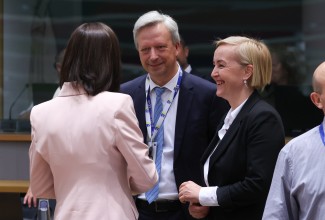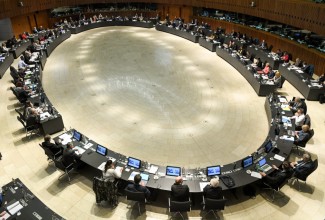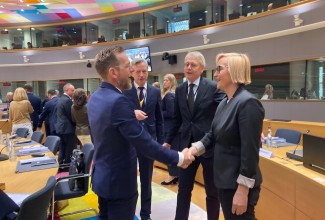Ülly Enn, Head of International Cooperation at the Ministry of Education and Research, highlighted that this year marks Estonia's 20th anniversary of joining the European Union. Over these two decades, approximately 120,000 Estonians have participated in the Erasmus+ and European Solidarity Corps programs. Figuratively speaking, the entire population of cities like Tartu and Viljandi has benefited from these flagship EU education and youth programs. "These are people who, thanks to EU programs, have personal experience and competence to create positive changes in Estonia's education, youth, and sports sectors," Enn emphasized.
Rait Toompere, head of the Erasmus+ and European Solidarity Corps agency, added that Estonia stands out in Europe for its exemplary participation in these programs. In the earlier years, Estonia was a popular destination country, but it was more challenging for Estonians to gain international experiences. He noted that the situation has changed over the years with more diverse program opportunities and growing awareness among people, leading to an increased desire to participate. Consequently, competition among projects has grown, resulting in higher standards for funded projects, which in turn means that the programs' impacts are becoming more relevant, richer, and more effective.
The study results confirm that Erasmus+ enhances lifelong learning and development opportunities, supporting digital transformation, environmental awareness, and internationalization in education, training, youth, and sports sectors. The program contributes to achieving both EU and Estonian sectoral strategic goals.
The European Solidarity Corps program is less known than Erasmus+, but according to the study, it is crucial for systematically supporting volunteer activities and youth-initiated solidarity projects. The program reflects the objectives of EU youth policy and complements national ambitions and efforts in the youth sector. Participation in ESC deepens democratic core values such as solidarity, diversity, tolerance, and openness.
Based on the study results, it can be stated that the programs have the most significant impact on those participating for the first time. Special attention is paid to ensuring that as many people as possible with fewer opportunities can participate. Additionally, it is important for project leaders and participants to be able to contextualize their activities, considering both the goals of the Estonian state and the programs.
Background Information:
- Both studies are based on document analysis, quantitative data from projects, and personal and group interviews with representatives of organizations involved with the programs, youth, and mentors.
- The Erasmus+ program, launched in 1987, is an EU initiative aimed at supporting people's educational, professional, and personal development through lifelong learning in education, training, youth, and sports sectors both in Europe and beyond.
- The European Solidarity Corps, established in 2018, is an EU-supported program that supports volunteer activities and community problem-solving solidarity projects for young people aged 18-30. The program aims to strengthen cohesion, solidarity, democracy, European identity, and civic education by addressing societal challenges.
- In Estonia, both programs are implemented by the Erasmus+ and European Solidarity Corps agency within the Education and Youth Board.
- You can read the Erasmus+ program study report HERE and the European Solidarity Corps report HERE. The presentation of the results can be viewed HERE.
For more detailed information please contact either Rait Toompere, Head of the Erasmus+ and European Solidarity Corps National Agency (rait.toompere@harno.ee) or Ülle Kurvits, Head of EU Affairs at the Ministry of Education and Research of Estonia (ulle.kurvits@hm.ee).




